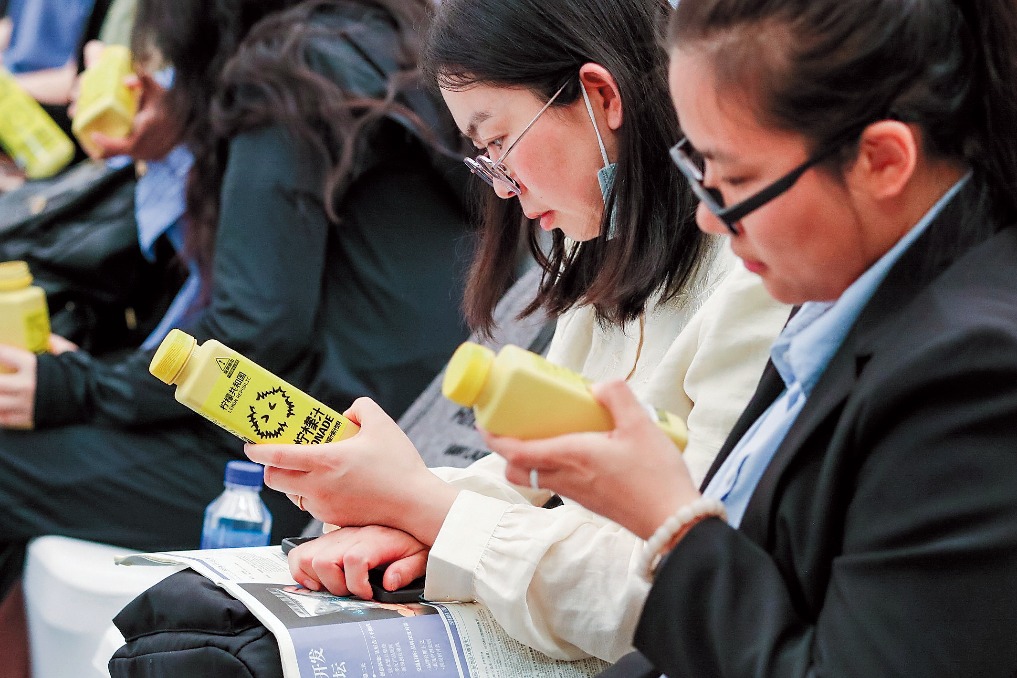Global ties more critical amid uncertainties
Former IMF official highlights role of cooperation in mitigating tariff impact

While the tariff policies wielded by the United States have ushered global businesses into a period of increased uncertainty, China is focused on building open and shared industrial chains to embrace international cooperation, and is leveraging its growing consumption momentum to boost global demand, senior economists said.
"While the high tariffs tipped by US President Donald Trump were a major shock, the deeper problem lies in the pervasive uncertainty that these policies have introduced into the global industrial landscape," said Zhu Min, former deputy managing director of the International Monetary Fund, during the recently concluded China Development Forum.
But Washington doesn't just stop there. Zhu said that the Trump administration's recent emphasis on "reciprocity" extends far beyond just tariffs, and includes "equivalence" in market access and capital market openness, among others.
Trying to achieve this level of comprehensive "reciprocity" across all these domains will likely add significant complexity and cost to the process of global industrial restructuring, Zhu said.
Since early this year, the restructuring, mergers and acquisitions of enterprises embedded in the global industrial chain remain sluggish, and large companies are reluctant to commit to long-term investment, due to the sheer scale of prevailing uncertainties stemming from the White House, Zhu added.
The Economic Policy Uncertainty Index for the United States — devised by researchers from Northwestern University, Stanford University and the University of Chicago — surged to an unprecedented level in February, reflecting the confusion and apprehension among investors and businesses since official data on the index were first compiled in 1985.
"This is the critical issue that companies must grapple with in the current environment of profound policy unpredictability," said Miguel Angel Lopez Borrego, CEO and chairman of Thyssen-Krupp AG, a German engineering and steel production enterprise.
Major foreign firms must be able to strike a delicate balance between globalization and regionalization, Borrego said, noting that many of the innovations needed to reshape these crucial global networks can only be realized through close collaboration between companies and governments across borders.
China possesses some of the most extensive and well-developed industrial and supply chain networks, complemented by a world-class logistics infrastructure, he said, adding that by tapping into China's expansive industrial and logistical resources, and cultivating deeper relationships with local partners, companies are able to reduce their costs and improve resilience to risks, and, more importantly, enhance their competitiveness in the global arena.
"Over the past few years, China's homegrown brands, technologies and domestic market are increasingly underpinning the evolution of its industrial and supply chains," Zhu said. "Meanwhile, Chinese companies are actively extending their reach from domestic value chains to global industrial ecosystems, integrating with international production networks."
Li Dongsheng, founder and chairman of consumer electronics company TCL Technology Group, said that Chinese companies are moving beyond a model focused solely on product exports, and instead are increasingly focused on setting up local production and assembly facilities overseas, and establishing regional operational hubs.
By deeply integrating their core competencies such as technological know-how and management skills with local economic development, they can foster open, collaborative and mutually beneficial industrial chains, Li added.
Zhu said China's consumption-boosting initiatives will help bolster overall demand in the international marketplace and emerge as a pivotal contribution to the stability of global industrial chains.
Earlier this month, China's policymakers set the country's deficit-to-GDP ratio at the highest level on record, in order to provide a much-needed boost to the nation's tepid consumer demand, and they also rolled out an action plan to shore up consumer spending, with a focus on increasing household incomes.
Increasing China's consumption base, while fostering the growth of both domestic and foreign brands catering to the Chinese market, will be critical, Zhu said, adding that as Chinese consumers become ever-larger drivers of worldwide demand, they provide a vital counterbalance to the potential volatility and contractions that could otherwise ripple through international supply networks.
- Europe urged to unite amid US tariffs, rising debt, and big tech challenges
- Beijing an upholder of trade system centered on WTO
- A new global economic order, if it can be built
- China criticizes US plan to impose tariffs on Venezuelan oil buyers
- Boao facilitates Asia's cooperation facing tariff threats




































